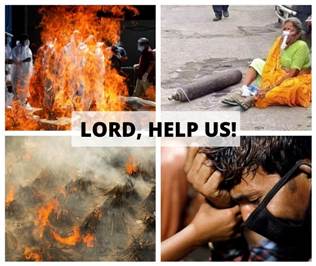Blockaded Compassion?
Written by Andrew Sloane
I caught my wife doom-scrolling first thing this morning. We’ve all done it, folly though it is. And inevitably the Israel-Gaza conflict popped up. Such a tragic, complex, and intractable conflict. And one that has caught up thousands of civilians. It’s easy to feel overwhelmed by the images of violence and suffering. And for those of us who are Christians, it is even easier, perhaps, to feel overwhelmed theologically.
This sense of theological confusion was brought home to me in conversation with my friends at Baptist World Aid Australia the other day. As you’d expect from a bunch of people committed to helping people in desperate need, they recently launched an appeal targeting the Middle East crisis. I was delighted to hear it—but also a little disturbed to hear that not only have they received less response than they would normally expect, actually received some push-back from Christian supporters. It prompted to ask myself why—and how as an ethicist, theologian and OT scholar I’d want to reply to their critics.
So, why would anyone think that providing emergency medical relief to people caught up in the conflict in Gaza and the West Bank could be wrong? Of course, there are lots of reasons, some more reasonable than others. Israel was the target of an indiscriminate terrorist attack. True, and horrifyingly evil. So, perhaps providing relief to Palestinians condones terrorism and supports those complicit in those evil acts? Well, no. It doesn’t take much digging to see that Hamas receives nothing like the unanimous support of the 2.4 million Palestinians in Gaza. And most of those 2.4 million people are civilians—including thousands of children—who’ve now lost access to power, water, and basic medical supplies. There’s a lot that could be said about that.
But, given my background and expertise, I’m more concerned with the theological reasons people gave to reject any action that doesn’t entail full and uncritical support for the modern state of Israel and its claims on the land. Let’s call that Israeli exceptionalism: the idea that the founding of the modern state of Israel is the result of God’s action in fulfilling OT prophecy; the Jewish state has absolute and God-given rights over the whole of this territory; and that the state of Israel enjoys a favored position under God and must be protected at all costs. The current nation-state of Israel, it is argued, has unqualified, absolute, and inviolable title to the land.
Now, there are major issues in the understanding of OT prophecy and how it has been fulfilled in Christ and will be fulfilled at the end of history (what are called by some the ‘end-times’, and by others the eschatological purposes of God). I am personally not persuaded by those interpretations of the Scriptures (broadly speaking, dispensationalist approaches). But let me leave that to one side and ask whether it’s at all plausible theologically to claim that Israel has absolute and unqualified rights to this land.
Clearly, if you’ve read this far, you’ll realise that I think not. First, the New Testament nowhere explicitly ties its message of hope to territorial claims to the land of Israel (See the work of Gary Burge). For instance, whatever we make of Paul’s words about the salvation of ‘all Israel’ (Romans 11:26), the hope that he expresses in these verses is clearly tied to removal of sin (11:27), without any explicit mention of restoration to the land. Second, and more importantly in my view, there is no unqualified, absolute, inviolable entitlement to the land in the Old Testament.
Let’s go back to the original call of Abram and Sarai the promises given to their family. True, that includes the promise of the gift of the land of Canaan (which in much of the Hebrew Bible is called Israel and Judah). But it comes with a purpose—that Abraham (ashe comes to be re-named) and his descendants might learn to do what is right and just (Genesis 18:17–19). That connection between the ancestral call and promise and walking in the ways of the LORD persists through the HB/OT. So, too, does the tying of the gift of the land to God’s people’s response to that call. If the nations are ‘vomited out’ by the land due to their wickedness, so too will Israel be if they fail to follow the ways of the LORD (Leviticus 18:24–28; Leviticus 26; Deuteronomy 28; see also Ezekiel 36:16–21). Those ways, of course, are not limited to avoiding idolatry and pursuing personal morality. A commitment to justice and the care of the vulnerable was central to walking in the ways of the LORD from Abraham on (Exodus 22:21–22; Leviticus 19:33–34). That is, perhaps, most succinctly put in Deuteronomy 10:12–22 where, in explicit imitation of God’s own character and action, they are called to ‘love those who are aliens, for you yourselves were aliens in Egypt’ (Deut 10:19). Failure to walk in the ways of the LORD invalidates the land gift.
The same concerns are seen in the prophets—especially in their vision of a renewed Israel after exile and judgment. Fundamental to that is the renewal of the people of God in their commitment to the ways of the LORD. Echoing the Torah that so shapes their message, the prophets call Israel to a renewal in holiness and mercy and justice (Micah 6:6–8). That transformation of the character of the people of God is both central to their message of hope and a prerequisite for Israel’s restoration to the land (Hosea 2:14–23; Jeremiah 31:31–34). This is, perhaps, most clearly seen in Ezekiel’s vision of the restoration of Israel after judgement and exile. Only after their redemption and transformation by God’s own action can they return to the land (Ezekiel 36:24–36). Only those who follow in the ways of the LORD are entitled to the land—and that, of course, entails that they imitate God’s own ways of justice and care for the vulnerable—including the aliens. Interestingly, this is so important in Ezekiel’s vision of the renewal of Israel and the land that aliens—non-Israelite residents in the land—are given equal share in the redistribution of the renewed land (Ezekiel 47:21–23).
Now, all of that might seem like the irrelevant musings of a biblical scholar. But here’s the point: there is no unqualified, absolute, inviolable entitlement to the land in the Old Testament. There is no doctrine of Israeli exceptionalism. Enjoying the land promise always requires that God’s people walk in the ways of the LORD, including the call to imitate God’s own commitment to the needs of the vulnerable, amongst whom are the non-Israelite residents of the land. If the Bible expects another return of Israel to the land (and I think that’s a very big if), it is only valid for those who walk in the ways of the LORD by doing what is right and just (including the treatment of aliens). I find it hard to see how the treatment of Palestinians in Israel and the West Bank fits with that.
I find it impossible to see how it is consistent with the conduct of a military campaign that indiscriminately impacts non-combatants, including children.
Without digressing into a discussion of Christian views of war and pacifism, it’s worth briefly noting that the most common theological legitimation of (limited) use of force in war, the Just War tradition, requires that any force must be limited, proportionate to the ends in view, that those ends must be just ends and attainable only by the use of force, and that it be restricted as much as is possible to combatants. That is, there can be no justification in that theological tradition, for use of force that indiscriminately effects civilians, especially children. It is difficult—no, impossible—to see Israel’s complete blockade of Gaza, a tiny strip of the eastern Mediterranean coast that is home to 2.4 million people as discriminating between military andnon-military personnel. Not when it stops the provision of food, energy, and medical supplies to the entire populace. And that’s to say nothing about active military action in Gaza and the West Bank. I find it difficult—no, impossible—to see this as a just war—especially as it falls short of internationally accepted rules of war.
And so, to return to the question that I started with. Does the current nation-state of Israel have unqualified, absolute, and inviolable title to the land? No. Does recognition of the grievous wrongs of the Hamas attacks on Israel require our uncritical support of Israel’s response? No. Are there any valid theological grounds to see a compassionate response to the humanitarian disaster unfolding in Gaza as illegitimate for Christians? No.
Let’s walk in the ways of the LORD and give up any theological blockade of BWAA’s response of justice and compassion.
















